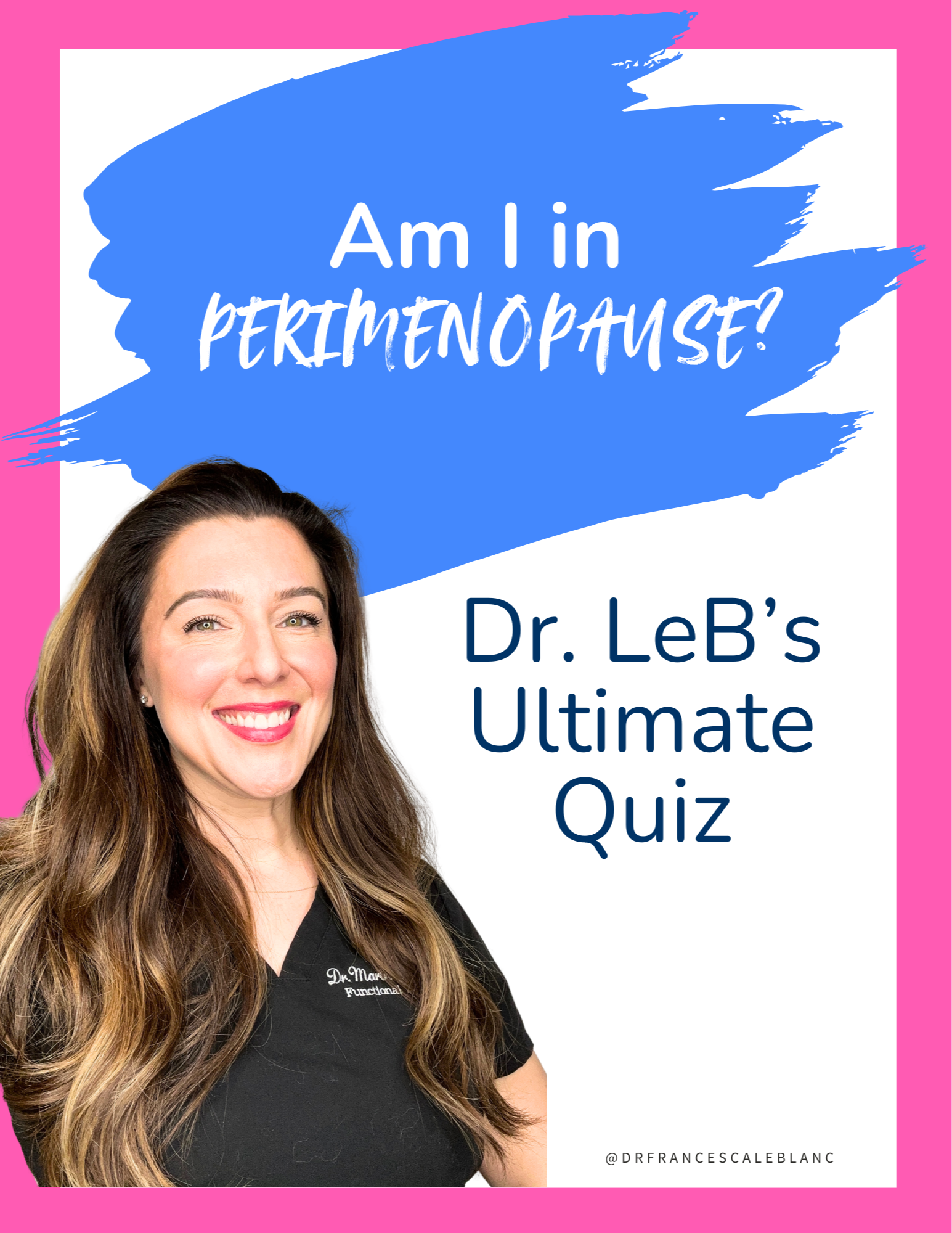3 Things Women Still Don’t Believe - But Science Says Otherwise

A deep dive into the physiology every woman in perimenopause needs to understand
After more than a decade in integrative hormone health, I can tell you this: women are being misled, under-fueled, and over-stressed into hormonal chaos. And the worst part? Most of it is preventable once you understand the actual biology behind what’s happening. Today, I’m breaking down three things women still push back on — and showing you the research behind why these aren’t “opinions,” they’re physiology. Let’s go.
1. You Cannot Out-Supplement a Dysregulated Nervous System
Here’s the unfiltered truth: You can take magnesium, ashwagandha, L-theanine, and whatever else Instagram says is “regulating,” but if your nervous system is locked in a chronic stress response, your hormones are absolutely going to be scrambled.
Why? Because stress hormones override sex hormones. Period.
When your brain perceives a threat (even if it’s traffic, parenting, inboxes, or chronic overwhelm), your hypothalamus signals the release of corticotropin-releasing hormone (CRH). CRH activates cortisol production.
And here’s where things go sideways:
-
Cortisol suppresses GnRH, the hormone that starts the entire reproductive-hormone cascade. This means ovulation becomes irregular or weak.
-
High stress reduces luteinizing hormone (LH) and follicle-stimulating hormone (FSH). Translation: fewer robust follicles = more hormone symptoms.
-
Chronic sympathetic activation (fight-or-flight) decreases progesterone because progesterone is used as a precursor for cortisol.
-
Elevated cortisol alters thyroid hormone conversion, decreasing peripheral T3.
This is why some women feel like supplements “don’t work.” Your body is too busy surviving to regulate, digest, ovulate, detoxify, or metabolize effectively.
What does regulate the nervous system?
Not supplements, though they can help. But the drivers are:
-
Slow diaphragmatic breathing
-
Downshifting the sympathetic response
-
Trauma-informed somatic practices
-
Sleep regularity
-
Walking (underrated and extremely effective)
-
Carving space for recovery
Spicy truth: Regulation > supplements.
2. Under-Eating Is Sabotaging Your Metabolism
If you are eating like a bird, feeling tired, gaining weight, and wondering why hormones are “broken,” this one’s for you. Most women in early perimenopause are unknowingly under-eating, often consuming 1100–1400 calories/day (sometimes less). Instead of helping weight loss, this slows everything down.
Here’s the physiology:
A. Chronic low intake → reduced thyroid output
When energy intake drops below energy needs, the hypothalamus decreases TRH, reducing TSH, slowing thyroid hormone production. Your body senses famine, not “weight loss goals.”
-
Starvation/energy deficit suppresses T3, lowers metabolic rate
B. The body preserves fat when it senses scarcity
Metabolic adaptation (sometimes called “adaptive thermogenesis”) is extremely real. The body reduces:
-
Resting metabolic rate
-
Non-exercise movement
-
Thermic effect of food
-
Reproductive hormone production
This makes fat loss harder, not easier.
C. Protein intake matters more than women realize
Most women do not consume enough protein to:
-
Support muscle
-
Stabilize blood sugar
-
Produce metabolic heat
-
Regulate appetite hormones
Perimenopause accelerates muscle loss and without adequate protein, metabolism drops fast. Protein isn’t optional. It’s metabolic medicine. And no… coffee is not breakfast. Skipping protein in the morning worsens glucose instability, cortisol spikes, and mid-day crashes.
3. If Your Gut Is Inflamed, Your Hormones Are Too
Women don’t want this one to be true, but it is. Your gut and your hormones are not separate systems. They’re in constant conversation.
A. The gut microbiome influences estrogen metabolism
There is an entire collection of bacteria called the estrobolome — microbes capable of metabolizing estrogens. When gut bacteria produce too much β-glucuronidase, estrogen gets reabsorbed instead of eliminated. This contributes to:
-
Estrogen dominance symptoms
-
PMS flares
-
Heavy periods
-
Breast tenderness
-
Cycle irregularities
B. Dysbiosis = inflammation = hormone disruption
Imbalanced gut bacteria release lipopolysaccharides (LPS), an inflammatory molecule that disrupts:
-
Ovulatory signaling
-
Progesterone synthesis
-
Thyroid hormone conversion
-
Insulin sensitivity
Inflammation is downstream of gut imbalance. Hormone symptoms are downstream of inflammation.
C. The gut and liver work as a team
Your liver detoxifies estrogen, but the gut eliminates it. If the gut is sluggish, inflamed, constipated, or overrun by histamine-producing microbes… Estrogen recirculates. This is not woo. This is biochemistry.
This isn’t “wellness advice.” This is physiology.
-
Stress dysregulation alters hormone signaling.
-
Under-eating slows thyroid function and metabolism.
-
Gut imbalance drives inflammation and disrupts estrogen, thyroid hormones, and insulin.
These mechanisms are well-documented in the literature but rarely explained in a way that helps women understand the “why” behind their symptoms. My work is helping you take back that understanding.
So What Do You Do With This Information?
Start with nervous system regulation, fuel your body adequately (especially protein), and address gut inflammation with evidence-based strategies. Then, use data, not guesswork. Full hormone testing (thyroid, cortisol rhythm, insulin markers, estrogen & progesterone metabolites, GI assessments) gives us the map your symptoms alone cannot. This is how we create real transformation. If you want a deeper dive into my hormone strategy, reach out. I share science-backed protocols weekly so you never have to navigate perimenopause blindfolded.




